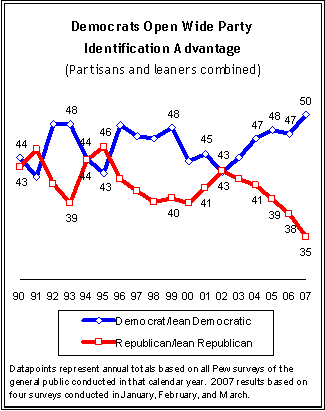Last week I reported on the wide and growing partisan divide in US public opinion over global warming: self-identified Democrats are 39 percentage points more likely than their Republican counterparts to rate climate change as a serious problem.
But what puzzled me most was the 13-point drop in concern among Republicans since 1999. Call me naïve, but with all the scientific evidence that’s been piling up on the issue—accompanied by increasing media attention—I guess I expected slow (though perhaps reluctant) increases in concern all across the political spectrum. Years of rising global temperatures, melting sea ice, and solidifying scientific consensus ought to have converted at least some honest skeptics, right?
A big report released last week by Pew, charting 2 decades of American political values and core attitudes, provides some clues about what’s going on.
Typical Republicans, circa 1999, haven’t necessarily found their belief in global warming shaken over the years. Instead, for whatever combination of reasons, people who believe in global warming are drifting away from the Party.
Take a look at the graph. There’s been a seismic shift in party identification over the last five years—large numbers of people who formerly identified as Republican, and Independents who leaned Republican, are leaving the fold.
I don’t mean to suggest that global warming is the main cause of this trend. Not at all. In fact, as the Pew findings indicate, there are all sorts of reasons that former self-identified Republicans have let their party allegiance fade.
Still, there’s a lesson to be learned by political hopefuls on both sides of the aisle. It’s possible that—notwithstanding the rapid drop in Republican concern over the issue—climate skepticism may have become a hot potato. Hold onto it too long, and you’re going to get scalded.










Dan
But what puzzled me most was the 13-point drop in concern among Republicans since 1999. Call me naïve, but … I guess I expected slow (though perhaps reluctant) increases in concern all across the political spectrum. Years of rising global temperatures, melting sea ice, and solidifying scientific consensus ought to have converted at least some honest skeptics, right? No.The key here is ‘honest’ and ‘skeptics’.John Quiggin has coined a good phrase for the dwindling population who still don’t want to believe the overwhelming evidence for Anthropogenic Global Warming:Delusionists.This crowd, simply, does not want to hear it. Period. Sure, there are maybe 2-3% left out there who can be convinced by evidence, but the rest? Fuhgettaboudit. The delusionists who refuse to accept the fact of AGW have based their identity on hating whatever it is that they’ve chosen to hate about AGW. When you present evidence, you present it against their identity. You might as well start counting grains of sand on a beach. Instead of wasting our time trying to convert those who don’t want to convert, instead lets act sensibly and let them come along if they want to. If not, buh-bye now. Buh-bye! We’ll miss you! Bye!Let’s start educating the vast majority – the non-delusionists – on how to have society-wide discussions on action. Both mitigation and adaptation (or suffering, which is to not act). What will we do with more environmental refugees and how can we learn from Katrina in this regard? What does less water mean for the way we eat – does this mean less meat? And so on. We don’t know how to have these discussions and we need to learn.
Frank
Well, there’s that, and also the fact that warming has become a partisan issue. Corporate/Conservative organs (AEI, CEI, etc.) have pushed “doubt” propaganda on climate change, which has been lapped up by conservative media, and even mainstream media who are afraid of not appearing “balanced.” The conservative National Review has a section on climate change called “Planet Gore,” in a transparent effort to turn the “debate” into a “he said/she said,” “blue/red” issue. That’s only happened in the past few years, and it may explain why the climate change deniers in the Republican party have increased. It’s only in the past few years that denying climate change has become a standard plank of the right-wing agenda.
sjbourland
Denying climate change makes a certain lifestyle almost guilt-free. I’m talking about middle and upper-middle SUV-driving shopaholics with money to burn. Wealthy suburban Republicans (these are my clients as a personal chef) are in need of an ideology that supports giant houses, cheap energy, billions of disposable Starbucks cups, and daily, multiple shopping sprees. Climate denial is an enabling mechanism of consumerist culture.
Dan
The partisan issue divides itself among people whose ideology lends itself to a particular party. If you are of a certain mindset, you identify yourself with a certain party. I find it handy to use the phrases ‘self regarding’ and ‘other regarding’, this phenomenon further explained here.